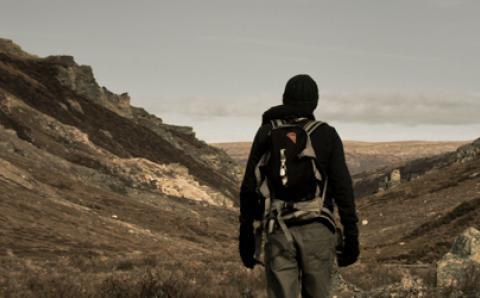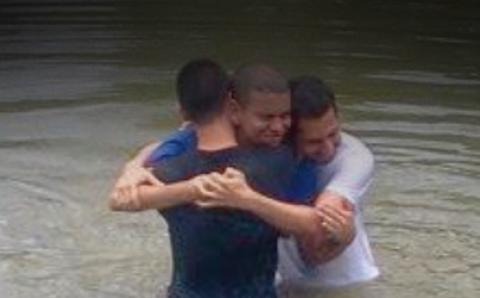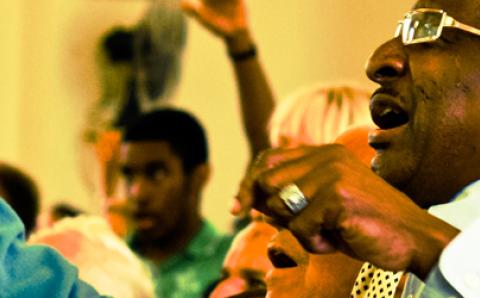It’s been almost ten days since Jesus ascended into heaven. The disciples and others of Jesus’ followers—120 in all, according to Acts—are huddled in the upper room in Jerusalem for Pentecost. Even at this time, Pentecost was an ancient Hebrew festival that celebrated the giving of the law on Sinai 50 days after the Exodus, or Passover.
Jesus had told this little band to wait there for the Comforter he would send, so they’ve made themselves ready for whatever he is going to send by living, eating, and praying together after his ascension.
As the Holy Spirit was revealed to these men and women, the sound of a strong wind and tongues of fire was surely, in and of itself, terrifying. And hearing dozens of other languages being spoken by people with whom they had spent the last three years was undoubtedly perplexing. You can imagine James thinking, “Hey, I never knew Matthew could speak Persian!” Or Bartholomew saying, “Where did Mark learn Parthian?” When did the disciples realize that they themselves were speaking something other than Aramaic or Hebrew?
The babble of tongues, each with its adherents listening raptly, is the first clue about what Pentecost—that fulfillment of the law—really means. Peter starts to figure it out when he refers his listeners to the prophet Joel quoting God’s words: “I will pour out my Spirit on all people. Your sons and daughters will prophesy, your old men will dream dreams, your young men will see visions” (2:28).
That, precisely, was the terror of Pentecost for the early church. Not that the sound of a strong wind took them by surprise. Not that tongues of fire appeared on top of their heads. Not even that they could suddenly speak fluently in languages previously unknown to them.
The terror of Pentecost was the realization that this new church was going to take a form they were totally unprepared for. It was going to mean accepting women and slaves and Gentiles. It was going to mean totally leaving their religious comfort zones for the sake of the gospel.
Of course, that realization didn’t sink in immediately. After Pentecost, Peter still struggled with the notion of “unclean” foods. The early church still argued about whether new Christians needed to be circumcised. Old ways die hard.
That is still the terror of Pentecost for us today. We’re no different from that early band of 120 people who were not so subtly hit over the head by the Spirit and had to figure out a new way of “doing synagogue.”
When the Spirit is poured out among believers, it’s up to the church to mold around the Spirit, not the other way around. We can’t shoe-horn the Spirit into whatever customs or rhythms we already have going. Surely the disciples remembered Jesus’ words: “The wind blows wherever it pleases. You hear its sound, but you cannot tell where it comes from or where it is going. So it is with everyone born of the Spirit” (John 3:8).
That is a terrifying prospect.
When the Spirit works, we step back, watch, and then get out of the way as we see how that same Spirit will work in us in response. When the Spirit chooses “undesirable” people, it’s not our prerogative to say, “We don’t want them.” When the Spirit brings in those from other countries, ethnicities, races, sexual orientations, and socio-economic backgrounds, we do not have the choice to say no. When the Spirit rips the doors off the church and blows in a freshening wind, we can do nothing other than bow in obedience and say yes.
That’s what it means to be Reformed and reforming. That is the true terror of Pentecost.
Web Questions
- Is there a good reason why the Holy Spirit was poured out on Pentecost? What might the connections be?
- What do the wind, the flaming tongues, and the speaking in tongues tell us about the work of the Holy Spirit?
- Van Kooten calls the fulfilment of Joel’s prophecy “the terror of Pentecost.” Do you believe that’s an accurate portrayal? Why or why not?
- Distinguish godly fear from the kind that stems from unbelief? Can you give biblical examples of both? When might you have experienced these your life?
- What is “the terror of Pentecost” today? Do you experience that in your church? When? How does your church address it? How should it address it?
- How should Reformed churches be always reforming? What kinds of changes of changes should we see as being of the Spirit? What kinds of changes are not of the Spirit?
About the Author
Valerie Van Kooten is a former Banner news correspondent as well as a freelance writer and editor. She teaches technical writing at Central College in Pella, Iowa, and writes grant proposals. She attends Trinity Reformed Church in Pella.







